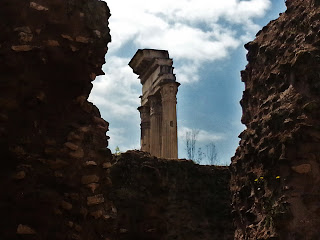Buried Treasure
 |
| One of the vies from inside The Forum |

My, my. For the untrained eye such as myself, I found myself enthralled with The Forum, far more than I found the Colosseum or even the Trevi Fountains. Walking through the area emblazoned with their brief descriptive signs of the history of each site (such signs seemed rare throughout many of the attractions in Rome), my wife and I could visualize what must have once been a thriving marketplace of plebeians and politicians, towering pillars and fabulous carvings atop grand buildings (although we would have never imagined that some of those buildings were taller than the pyramids of Egypt). Also buried in the cordoned-off rubble were polished blocks of marble, huge blocks that still gleamed despite what must have been hundreds of thousands of feet walking over them day after day at one point. Ah, it was as if we were visualizing Rome in its splendor, even the chariot stadium, while smaller than we thought, seeming to roar in its intensity. But then these were impressions coming to uneducated eyes, the eyes of us as tourists who really knew little about what we were seeing, newcomers trying to match the pieces of rubble we were seeing with what might only be a recreated HBO version of Rome or something straight out of a Hollywood movie (Ben Hur, anyone?).
 |
| One of the many signs throughout The Forum |
Life is like that so often, our ages catching up with us far quicker than expected and pushing our memories harder and harder as if to make up for it, all while realizing that our minds will be working like outdated hard drives that are shutting down unexpectedly and needing to reboot to a restore point. Things may be going into the cloud now, only the cloud for our minds seems more and more like a real cloud that is little more than vapor and is dissipating as the weather heats up. Civilizations though, just as with lives, come and go; and if enough time passes they get buried and lost perhaps to be revealed at a much later date, or then again perhaps never to be discovered...Angkor Wat, Mayan temples, each bearing small protrusions that now are revealing massive networks of roads and walkways that marked once-thriving cities. But all of this is happening today in Alaska. In an article from National Geographic, the town of Nunalleq is discovering artifacts from ages ago, ancestral clues long buried in the ice and only now making their way to the surface as the weather warms. And in a different issue, the Galapagos Islands (an archipelago of 100 outcroppings but just 13 recognized islands which are home to over 25,000 people but are visited by nearly 10 times that number of tourists) is facing the opposite, the threat of its history being buried as the ocean waters rise. It's The Forum all over, lands and civilizations, peoples and histories being covered and re-covered, lost and then found.
In the grand scheme of things, our lives are The Forum. For each of us, there was something grand in our years, something to be celebrated as greatly and as ceremoniously as any Roman emperor's display. Life may not have been easy, or on the other hand it may have been too easy. But one thing is certain, it was and is short. And just as with the towering pillars that once graced this marketplace called The Forum, we all will likely struggle to be remembered, our bones proving nowhere near as strong as the memories we hope to broadcast. An interesting interview series is ongoing, that of financier and philanthropist David Rubenstein interviewing world leaders of all sorts, from Yo-Yo Ma to Nike's Phil Knight. But when he interviewed Bill Gates, he asked what he --as someone who for 20 years was dubbed the richest man in the world-- would want to be remembered for, and found the answer rather surprising. His foundation helping to end malaria and other third world diseases or the foundation's work helping to spread education? That would be a great thing, he replied. But most of all he thought that being remembered as a good father would be all that he wanted. Warren Buffet was much the same. Perhaps as much as we try to build something grandiose, even in our lives, it ends up being the simple things that matter most. A good parent, a good son...probably even a good uncle.




Comments
Post a Comment
What do YOU think? Good, bad or indifferent, this blog is happy to hear your thoughts...criticisms, corrections and suggestions always welcome.